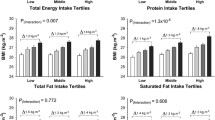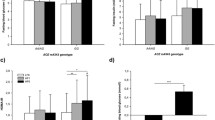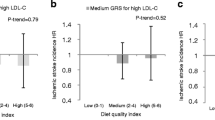Abstract
Purpose
The fat mass and obesity-associated gene (FTO) is related to obesity and coronary heart disease (CHD). We studied interaction between macronutrient intake and FTO in association with CHD risk or body mass index (BMI).
Methods
The pooled population-based case–control studies, SHEEP and INTERGENE, included 1,381 first-time CHD patients and 4,290 population controls genotyped for FTO rs9939609 (T/A). Diet data were collected in self-administered food frequency questionnaires. Macronutrients were dichotomized into low/high energy percentages (E %) by median levels in controls. Association of FTO genotype (TA/AA vs. TT) with CHD risk was analysed by multiple logistic regression, and with BMI by multiple linear regression. Interaction between FTO and macronutrient was assessed by introducing an interaction term FTO × macronutrient. Interaction on CHD as deviation from additive effects was assessed by calculating relative excess risk due to interaction.
Results
No statistically significant interaction was found between FTO genotype and any macronutrient on CHD risk or BMI on either the multiplicative or additive scale. However, FTO genotype (TA/AA vs. TT) was associated with significantly increased CHD risk only in subjects with low E % from fat (OR 1.36, 95 % CI 1.11–1.66) or saturated fatty acids (OR 1.36, 95 % CI 1.10–1.69), or in subjects with high E % from carbohydrate (OR 1.32, 95 % CI 1.07–1.61) or protein (OR 1.41, 95 % CI 1.13–1.75). Mean BMI was 0.3–0.6 kg/m2 higher in control subjects with TA/AA compared to TT, regardless of macronutrient E %.
Conclusions
We found no evidence of interactions between FTO genotype and macronutrient intake on CHD risk or BMI.

Similar content being viewed by others
References
Frayling TM, Timpson NJ, Weedon MN et al (2007) A common variant in the FTO gene is associated with body mass index and predisposes to childhood and adult obesity. Science 316:889–894
Dina C, Meyre D, Gallina S et al (2007) Variation in FTO contributes to childhood obesity and severe adult obesity. Nat Genet 39:724–726
Scuteri A, Sanna S, Chen WM et al (2007) Genome-wide association scan shows genetic variants in the FTO gene are associated with obesity-related traits. PLoS Genet 3:e115
Hunt SC, Stone S, Xin Y et al (2008) Association of the FTO gene with BMI. Obesity 16:902–904
Liu C, Mou S, Pan C (2013) The FTO gene rs9939609 polymorphism predicts risk of cardiovascular disease: a systematic review and meta-analysis. PLoS ONE 8:e71901
Gustavsson J, Mehlig K, Leander K et al (2014) FTO genotype, physical activity, and coronary heart disease risk in Swedish men and women. Circ Cardiovasc Genet 7:171–177
Larder R, Cheung MK, Tung YC, Yeo GS, Coll AP (2011) Where to go with FTO? Trends Endocrinol Metab 22:53–59
Fischer J, Koch L, Emmerling C et al (2009) Inactivation of the Fto gene protects from obesity. Nature 458:894–898
Church C, Lee S, Bagg EA et al (2009) A mouse model for the metabolic effects of the human fat mass and obesity associated FTO gene. PLoS Genet 5:e1000599
den Hoed M, Westerterp-Plantenga MS, Bouwman FG, Mariman EC, Westerterp KR (2009) Postprandial responses in hunger and satiety are associated with the rs9939609 single nucleotide polymorphism in FTO. Am J Clin Nutr 90:1426–1432
Wardle J, Carnell S, Haworth CM, Farooqi IS, O’Rahilly S, Plomin R (2008) Obesity associated genetic variation in FTO is associated with diminished satiety. J Clin Endocrinol Metab 93:3640–3643
Qi Q, Kilpelainen TO, Downer MK et al (2014) FTO genetic variants, dietary intake and body mass index: insights from 177 330 individuals. Hum Mol Genet. doi:10.1093/hmg/ddu411
Tanaka T, Ngwa JS, van Rooij FJ et al (2013) Genome-wide meta-analysis of observational studies shows common genetic variants associated with macronutrient intake. Am J Clin Nutr 97:1395–1402
Park SL, Cheng I, Pendergrass SA et al (2013) Association of the FTO obesity risk variant rs8050136 with percentage of energy intake from fat in multiple racial/ethnic populations: the PAGE study. Am J Epidemiol 178:780–790
Brunkwall L, Ericson U, Hellstrand S, Gullberg B, Orho-Melander M, Sonestedt E (2013) Genetic variation in the fat mass and obesity-associated gene (FTO) in association with food preferences in healthy adults. Food Nutr Res. doi:10.3402/fnr.v57i0.20028
Kilpelainen TO, Qi L, Brage S et al (2011) Physical activity attenuates the influence of FTO variants on obesity risk: a meta-analysis of 218,166 adults and 19,268 children. PLoS Med 8:e1001116
Sonestedt E, Roos C, Gullberg B, Ericson U, Wirfalt E, Orho-Melander M (2009) Fat and carbohydrate intake modify the association between genetic variation in the FTO genotype and obesity. Am J Clin Nutr 90:1418–1425
Corella D, Arnett DK, Tucker KL et al (2011) A high intake of saturated fatty acids strengthens the association between the fat mass and obesity-associated gene and BMI. J Nutr 141:2219–2225
Vimaleswaran KS, Angquist L, Hansen RD et al (2012) Association between FTO variant and change in body weight and its interaction with dietary factors: the DiOGenes study. Obesity 20:1669–1674
Corella D, Ortega-Azorin C, Sorli JV et al (2012) Statistical and biological gene-lifestyle interactions of MC4R and FTO with diet and physical activity on obesity: new effects on alcohol consumption. PLoS ONE 7:e52344
Ortega-Azorin C, Sorli JV, Asensio EM et al (2012) Associations of the FTO rs9939609 and the MC4R rs17782313 polymorphisms with type 2 diabetes are modulated by diet, being higher when adherence to the Mediterranean diet pattern is low. Cardiovasc Diabetol 11:137
Sonestedt E, Gullberg B, Ericson U, Wirfalt E, Hedblad B, Orho-Melander M (2011) Association between fat intake, physical activity and mortality depending on genetic variation in FTO. Int J Obes 35:1041–1049
Berg CM, Lappas G, Strandhagen E et al (2008) Food patterns and cardiovascular disease risk factors: the Swedish INTERGENE research program. Am J Clin Nutr 88:289–297
Reuterwall C, Hallqvist J, Ahlbom A et al (1999) Higher relative, but lower absolute risks of myocardial infarction in women than in men: analysis of some major risk factors in the SHEEP study. J Intern Med 246:161–174
Wolk A, Ljung H, Vessby B, Hunter D, Willett WC (1998) Effect of additional questions about fat on the validity of fat estimates from a food frequency questionnaire. Study Group of MRS SWEA. Eur J Clin Nutr 52:186–192
Berg C, Lappas G, Wolk A et al (2009) Eating patterns and portion size associated with obesity in a Swedish population. Appetite 52:21–26
Mifflin MD, St Jeor ST, Hill LA, Scott BJ, Daugherty SA, Koh YO (1990) A new predictive equation for resting energy expenditure in healthy individuals. Am J Clin Nutr 51:241–247
Energy and protein requirements (1985) Report of a joint FAO/WHO/UNU Expert Consultation. World Health Organ Tech Rep Ser 724:1–206
Pearce N (1993) What does the odds ratio estimate in a case–control study? Int J Epidemiol 22:1189–1192
Knol MJ, VanderWeele TJ (2012) Recommendations for presenting analyses of effect modification and interaction. Int J Epidemiol 41:514–520
Lawrence GD (2013) Dietary fats and health: dietary recommendations in the context of scientific evidence. Adv Nutr 4:294–302
Siri-Tarino PW, Sun Q, Hu FB, Krauss RM (2010) Meta-analysis of prospective cohort studies evaluating the association of saturated fat with cardiovascular disease. Am J Clin Nutr 91:535–546
Jakobsen MU, O’Reilly EJ, Heitmann BL et al (2009) Major types of dietary fat and risk of coronary heart disease: a pooled analysis of 11 cohort studies. Am J Clin Nutr 89:1425–1432
Lissner L, Troiano RP, Midthune D et al (2007) OPEN about obesity: recovery biomarkers, dietary reporting errors and BMI. Int J Obes 31:956–961
Acknowledgments
The research was funded by grants from the Västra Götaland County Council, the Swedish Council for Working Life and Social Research, the Swedish Research Council, the Swedish Research Council for Environment and Spatial Planning, the Swedish Heart and Lung Foundation, and AstraZeneca R&D Sweden.
Conflict of interest
All authors have no financial disclosures and no conflict of interest.
Author information
Authors and Affiliations
Corresponding author
Electronic supplementary material
Below is the link to the electronic supplementary material.
Rights and permissions
About this article
Cite this article
Gustavsson, J., Mehlig, K., Leander, K. et al. FTO gene variation, macronutrient intake and coronary heart disease risk: a gene–diet interaction analysis. Eur J Nutr 55, 247–255 (2016). https://doi.org/10.1007/s00394-015-0842-0
Received:
Accepted:
Published:
Issue Date:
DOI: https://doi.org/10.1007/s00394-015-0842-0




